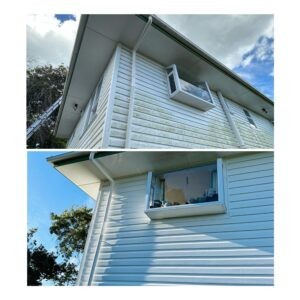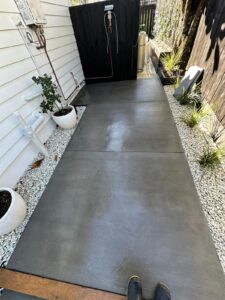Tauranga’s Best Water Blasting Tips for Homeowners: What to Know Before You Spray
In Tauranga, exterior surfaces take a serious beating from the elements — salt air, moss, pollen, rain, and constant humidity. Water blasting (also known as pressure washing) is one of the most popular methods to remove stubborn grime, strip away stains, and restore your home’s curb appeal.
But there’s a catch: done wrong, water blasting can permanently damage your property. Cracked cladding, stripped paint, splintered decks, or water intrusion into your home — we’ve seen it all.
Whether you’re tackling a weekend project in Papamoa, preparing a rental property in Mount Maunganui, or just maintaining your family home in Bethlehem, this guide will walk you through the top water blasting tips, what to avoid, and when to call in the pros.
What Is Water Blasting?
Water blasting uses high-pressure water jets to clean surfaces. Unlike soft washing (which uses low pressure and detergents), water blasting relies on pressure to break up dirt, grime, and organic buildup. It’s commonly used for:
- Driveways and concrete
- Decks and timber surfaces
- Retaining walls and fences
- Pavers and tiles
- Garage floors and patios
- Exterior steps and walkways
When used correctly, it’s an efficient way to refresh your property. But the key word is correctly.
Tip #1: Know When to Use Water Blasting (And When Not To)
Water blasting isn’t the best tool for every job.
Ideal Surfaces for Water Blasting:
- Concrete driveways and paths
- Brick pavers and patio tiles
- Stained retaining walls
- Heavily mossy fences (pre-treated)
- Garage floors and car parks
Surfaces to Avoid Water Blasting:
- House cladding (especially timber, plaster, or fiber cement)
- Painted weatherboards
- Timber decks (soft wood or aging boards)
- Roof tiles or long-run iron roofs
- Gutters and downpipes
- Any area with cracks, gaps, or poor waterproofing
For these, soft washing is the safer option, using detergents and low pressure to avoid damage.

Tip #2: Prep Your Area Properly
Before blasting, remove or cover:
- Outdoor furniture
- Plants or garden beds near the blast zone
- Vehicles
- Power outlets and outdoor lighting
- Pets and toys
Also, check all windows and doors are sealed tight — one missed latch can lead to wet floors and soaked curtains inside.
Tip #3: Use the Right Nozzle and Pressure Setting
Water blasters come with different nozzles for a reason. The wrong nozzle can damage your surface — or barely clean it at all.
- 0° (red tip): Very narrow and aggressive — not recommended for home use
- 15° (yellow tip): Great for concrete and hard surfaces
- 25° (green tip): Good general-purpose cleaner for decks and paths
- 40° (white tip): Best for gentle cleaning, rinsing, and delicate surfaces
- Soap nozzle: Low pressure for detergent application
Also check your machine’s PSI rating. For most residential work:
- 1500–2000 PSI is plenty for wood and soft surfaces
- 2500–3000 PSI works well for concrete
- 4000+ PSI is for industrial jobs — best left to professionals
Tip #4: Always Work in Sections
Instead of randomly blasting the entire surface, work in small, manageable sections (e.g. 1–2 square metres). This keeps pressure consistent and avoids streaks or lap marks.
Use a consistent spray distance (usually 30–45 cm from the surface), and move slowly in overlapping passes. If you’re too fast or too close, you’ll gouge the surface or leave stripes.
Tip #5: Pre-Treat With Detergents for Better Results
If you’re tackling moss, algae, or oil stains, start with a biodegradable detergent. These help break down organic matter so the water pressure can remove it more easily.
At Metro Water Blasting Tauranga, we use eco-friendly pre-treatments that are safe for plants and pets — and they make a huge difference in the final result.
Tip #6: Watch the Weather
Avoid blasting in full sun — water evaporates too quickly and leaves streaks. Cool, overcast days are ideal. And don’t spray during high winds, or you’ll end up soaked and uneven.
Also allow drying time after blasting before applying any stain, paint, or sealant to a cleaned surface.
Tip #7: Don’t Overdo It
More pressure isn’t always better. We’ve seen:
- Deck boards splintered from aggressive blasting
- Pavers dislodged and grout blown out
- Paint stripped from fences
- Water forced behind cladding leading to rot and leaks
Always test a small area first. If the surface starts to lift, fray, or discolor — stop immediately.
Tip #8: Protect Yourself
Water blasters are not toys. They can cut skin, damage eyes, and even cause hospital-level injuries if mishandled.
Wear:
- Enclosed shoes or work boots
- Safety goggles or a face shield
- Gloves
- Hearing protection (especially with petrol units)
Also keep children and pets well away while operating.
Tip #9: Clean Up After Yourself
Water blasting kicks up a lot of debris — moss, dirt, algae, paint flakes. Use a broom, rake, or blower to clear paths and driveways after cleaning. Rinse garden beds if overspray landed there.
Don’t forget to empty any filters, flush the hose, and store your gear dry.
When to Call in the Professionals
If you’re not confident using a water blaster — or the job is large, steep, or involves delicate surfaces — it’s safer and smarter to hire pros.
At Metro Water Blasting Tauranga, we’ve seen plenty of DIY jobs gone wrong: etched concrete, broken windows, wet insulation, even fire alarms set off by spray getting indoors.
We offer:
✅ Commercial-grade gear
✅ Soft wash and pressure options
✅ Biodegradable pre-treatment solutions
✅ Expert staff trained in surface protection
✅ Full insurance and safety protocols
✅ Fast turnaround + 24/7 support
Services We Offer Throughout Tauranga
We don’t just offer advice — we provide professional water blasting for:
- Driveways
- Paths and walkways
- Retaining walls
- Car parks
- Patios and courtyards
- Commercial surfaces
We service all Tauranga suburbs, including:
- Mount Maunganui
- Papamoa and Papamoa Beach
- Otumoetai
- Welcome Bay
- Bethlehem
- Greerton
- Tauriko
- Pyes Pā
- Te Puke
- And surrounding rural areas
Real Client Story: A Concrete Transformation in Welcome Bay
A homeowner in Welcome Bay recently contacted us to clean a large sloped driveway stained with moss and tyre marks. They’d tried DIY blasting the year before, but the results were patchy and uneven.
We treated the surface with moss remover, then used our commercial surface cleaner to lift years of grime in one session. The concrete looked brand new — and was safe for the client’s kids to ride their scooters again.
Book Your Water Blasting Service Today
Thinking about freshening up your driveway, path, or exterior surface? Save yourself the mess, risk, and guesswork — and get professional results fast.
📞 Call 0800 997 997
💻 Or book online with Metro Water Blasting Tauranga

